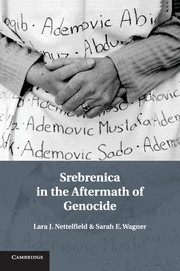‘Extending the purview of their single-authored books on Bosnia and Herzegovina, Nettelfield and Wagner have produced an authoritative account of genocide’s aftermath in the Drina Valley. The book easily surpasses most of what passes for scholarship on ‘post-conflict justice’. Closely observed, deeply researched, and empathetically written, their longitudinal analysis of local dynamics of contention in Srebrenica and environs complicates - in an admirable way - all kinds of simplistic assumptions about the nature and promise of international humanitarianism. By taking ethnography seriously, the authors have made an important contribution to both the study of genocide and of war.’
Jens Meierhenrich - London School of Economics and Political Science
‘Lara J. Nettelfield and Sarah E. Wagner have written a powerful and evocative book about Srebrenica, where there was the worst massacre in Europe since World War II. They focus on the reactions by a wide variety of actors in the aftermath of this tragedy. They employ categories of analysis from international law, cultural anthropology, political philosophy, and international relations. But the greatest strength of this book is the way the authors give voice to the victims whose lives are often now far removed from Bosnia but still haunted by the events of 1995 in Srebrenica. As the authors say, the wide-ranging reactions after the mass killings in Srebrenica display 'the extraordinary nature of the crimes, as well as the far-reaching legacy of loss'.’
Larry May - Professor of Law, Political Science and W. Alton Jones Professor of Philosophy, Vanderbilt University
‘Srebrenica in the Aftermath of Genocide represents a major contribution to the understanding of the politics of memory of the 1995 Srebrenica massacre in Bosnia-Herzegovina. Superbly written, it carefully charts the local and international contestation over the memory of the worst war crime in Europe since the Second World War in various sites, including in the media, in museums and at international criminal tribunals. Lara J. Nettelfield and Sarah E. Wagner combine their considerable and complementary talents as a comparative political scientist and socio-cultural anthropologist respectively, and this book is a testament to the value of interdisciplinary collaboration.’
Richard A. Wilson - Gladstein Professor of Human Rights and Professor of Anthropology and Law,University of Connecticut
‘Political scientist Lara J. Nettelfield and anthropologist Sarah E. Wagner have produced a masterpiece. For the international criminal law scholar and practitioner, the authors have demanded a re-thinking of ‘participation’ in genocide. For the anthropologist, this work addresses the cultural context within which domestic and international criminal and civil trials shape postwar Bosnia. Finally, the work of the historian and Slavic studies specialist will require close awareness to the people of Srebrenica: those who stayed, and those who were left behind. This excellent volume will soon be regarded as a major work on the post-genocide era in Srebrenica.’
Julie Mertus - American University, Washington DC
'Nettelfield and Wagner see the people of Srebrenica not merely as victims of genocide, but as individuals who have battled courageously for years against the system in order to secure basic human rights, taking steps - often and consciously - that had an impact on the entire region, as well as the international community. In a remarkable way, this book describes how genocide and mass war crimes affect society, at the same time they change and form it. After years of living and conducting research in Bosnia and Herzegovina, [Nettelfield and Wagner] have written one of the most important works to date about the lives of people who survived or were in some way affected by the Srebrenica genocide.'
Nidžara Ahmetašević
Source: Slobodna Bosna
'It is an exhaustive and landmark study … covering the progress of 'Srebrenica in court', at The Hague, the grotesque disinterrment of bodies from mass graves to 'secondary graves' and even tertiary ones to hide the evidence, the fortunes of Srebrenica's diaspora scattered worldwide and the vicious harassment of those survivors - mostly women, of course - who dare to return to their native soil.'
Ed Vulliamy
Source: Open Democracy (opendemocracy.net)
'Srebrenica in the Aftermath of Genocide is a major contribution to how the memory of the Srebrenica massacre in 1995 is understood, and thus how genocide and war crimes alter society. … a deeply researched and superbly written account of suffering and resistance in the face of destructive, anti-human forces.'
Paul R. Bartrop
Source: Holocaust and Genocide Studies



